Why are graduates competing to be prison officers?
- Published
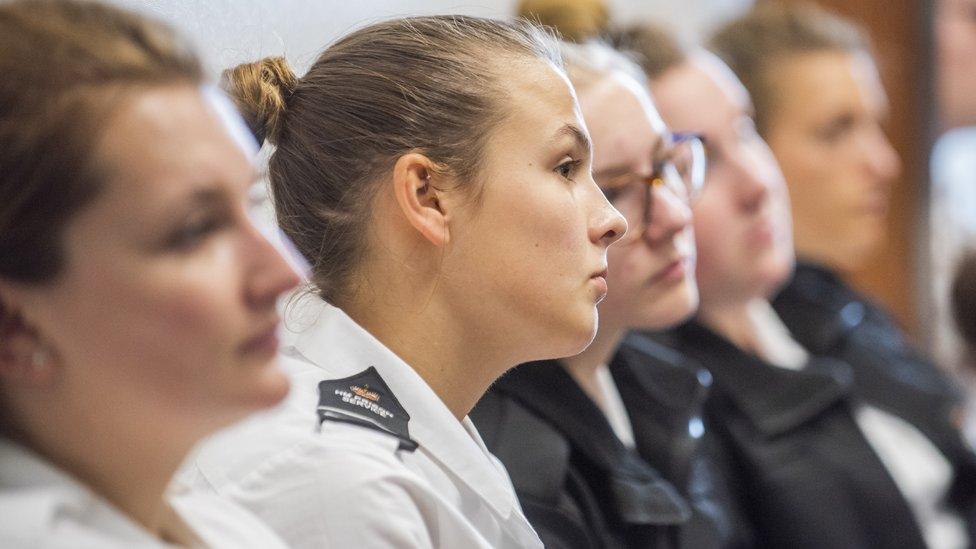
Ms Wilkinson (centre) and to her left, Ms Cathcart
The government-backed Unlocked Graduates scheme trains university leavers to work as prison officers. But how much difference can they make in prisons where staffing levels are low, and it's a rush even to do the bare minimum?
In a packed lecture theatre at the University of Suffolk, a man in a smart suit is telling his life story.
Peter Yarwood says he first went to prison as a 15-year-old, addicted to heroin and alcohol. He used to rob to fund his habit and spent two decades in and out of custody - until he met somebody who helped him to turn his life around.
"In 10 years I worked my way up from never having a job to being a CEO running a charity that employs 28 people," he tells his audience. "And I can trace that right back to an intervention by a prison officer."
The officer believed in him, Yarwood says, and gave him the encouragement he needed to change for the better. After his release, he founded the drug addiction charity, Red Rose Recovery.
Yarwood is addressing 100 recent graduates from all over the country, who listen intently and take notes. Many could go straight into well-paid jobs in law, business or banking but they have opted for something different: working in some of the country's grimmest prisons.
These young men and women have joined Unlocked Graduates, a scheme modelled on Teach First, which sends university leavers into schools in low-income areas to raise the aspirations of disadvantaged pupils.

Find out more
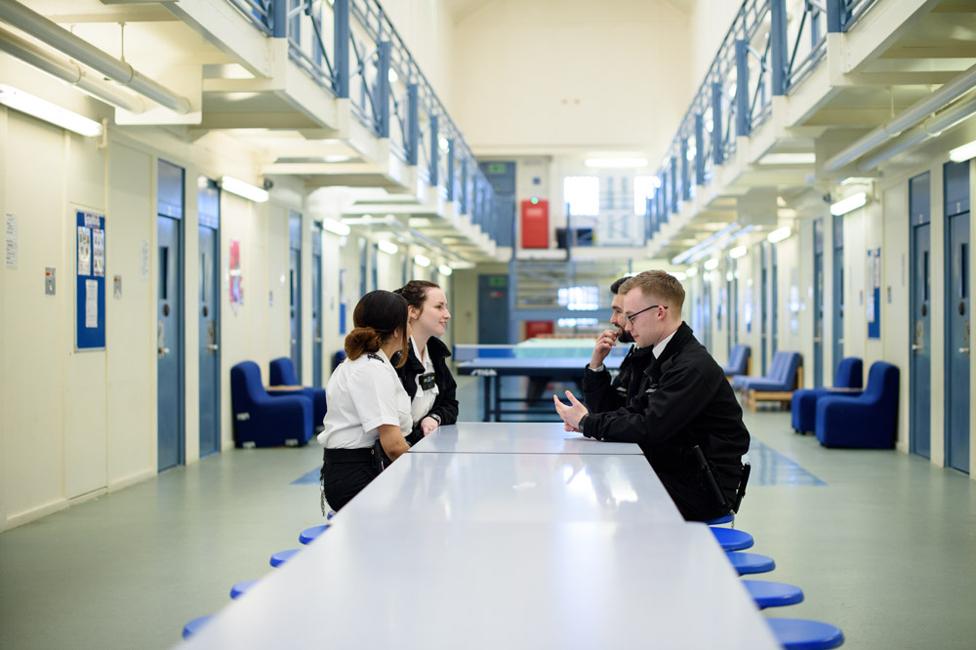
Listen to From College to Clink on BBC Radio 4 at 20:00 on Tuesday 23 July

Unlocked Graduates was founded two years ago by Natasha Porter who began her career with Teach First and is now determined to raise the status of what she calls Britain's least-valued job. Prison officers, she believes, are "more heroic" than any other public-sector worker.
"Every time they go to the pub and someone asks them what they do, and they say, 'I'm a prison officer,' a huge percentage of people assume that they're stupid, that they're thuggish, that they enjoy violence, that what they do every day is just open and close doors and then whinge about life," she says. "And yet every morning they get out of bed and they go into one of the most difficult environments and they literally save lives."
It is August 2018 and the graduates - the second intake of Unlocked Graduates - are on an intensive six-week residential training course. They are already in uniforms with numbered epaulettes on their shoulders and I am asked to use their surnames and title only - a quaint habit, but it's what they do in prisons.
They will do the same work as ordinary prison officers and take a Master's degree in what's called "leadership and custodial environments". They pay nothing for the MSc and get a starting salary of up to £30,000 - the same as other entry-level prison officers.

Ms Trewinard, a theology graduate, was looking for a career in marketing or public relations when she stumbled upon Unlocked. "It was the most interesting job description I'd heard in weeks, it really jumped out at me, so I applied," she says over lunch in the canteen.
The standard 12-week training for prison officers in England and Wales is the shortest in Europe and calls for no academic qualifications. You just need to be over 18, have the right to live in the UK and be reasonably fit, with good eyesight. In France the training lasts 48 weeks and you can only apply if you have the Brevet, roughly equivalent to GCSEs. Scandinavian countries train their prison officers for two to three years and insist on higher education. The Ministry of Justice tried to set the bar higher here, but the number of people applying plummeted, so it quickly made a U-turn.
Funnily enough, though, the Unlocked programme is oversubscribed - this year there were 15 applications per place.
The successful candidates' career choice did not always go down well at home.
"Initially my family was worried," says Mr Rai, a politics graduate from Warwick University. "That's because I'm one of the softest guys ever. My mum said, 'Nice knowing you!'" There's a burst of nervous laughter around the lunch table.
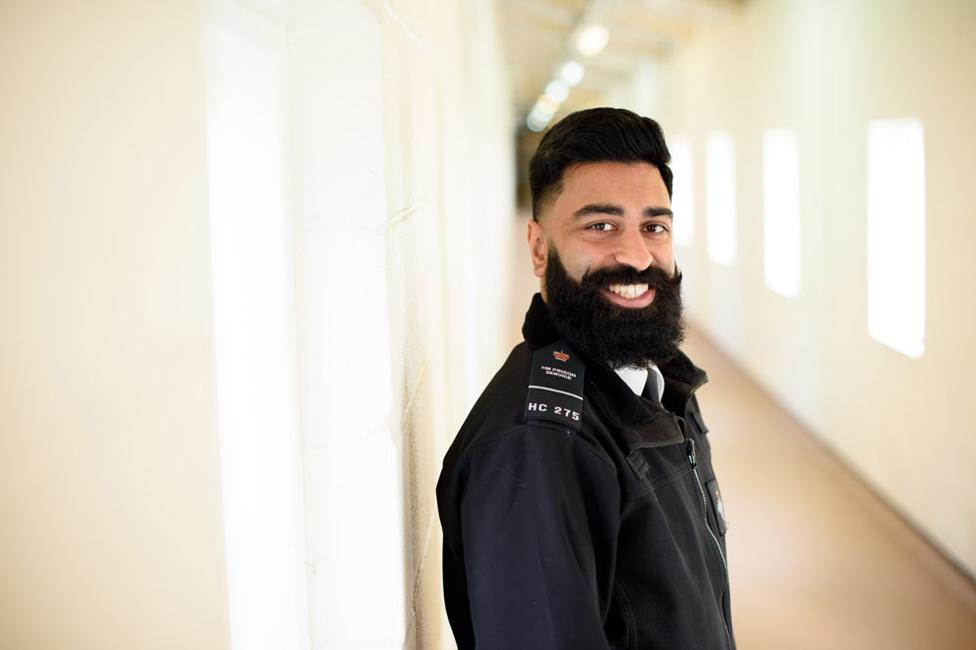
Mr Rai is now accustomed to making do without a mobile phone at work
Ms Trewinard says her brothers were supportive. "But my partner was apprehensive, saying, 'I'm not sure this is the right thing for you - there is a lot of violence in prisons.'"
Assaults on prison staff in England and Wales rose to a record high last year with almost 30 attacks on officers every day, according to the Ministry of Justice. That's equivalent to more than one every hour.
"I recently had a member of staff who will lose the sight in one eye after being attacked by a prisoner," says Al Miller, a branch officer with the Prison Officers' Association. He adds that a fellow officer was "hog-watered", or attacked with boiling water mixed with sugar. "It was thrown into his face," says Al. "Prisoners are prepared to inflict quite serious damage on each other, and on staff."
Al himself has had faeces poured over him, and lost some teeth when he was punched in the mouth by a young man who was angry about being sent to the segregation unit.
For the past 15 years, Al has been employed at the Aylesbury Young Offender Institution in Buckinghamshire - one of the most troubled prisons in the country, and the place where the group of nine graduates I am following have been sent to work.
A red-brick structure built in Victorian times, it holds 440 young men aged 17 to 21. One in 12 is serving a life sentence - for murder, rape or armed robbery.
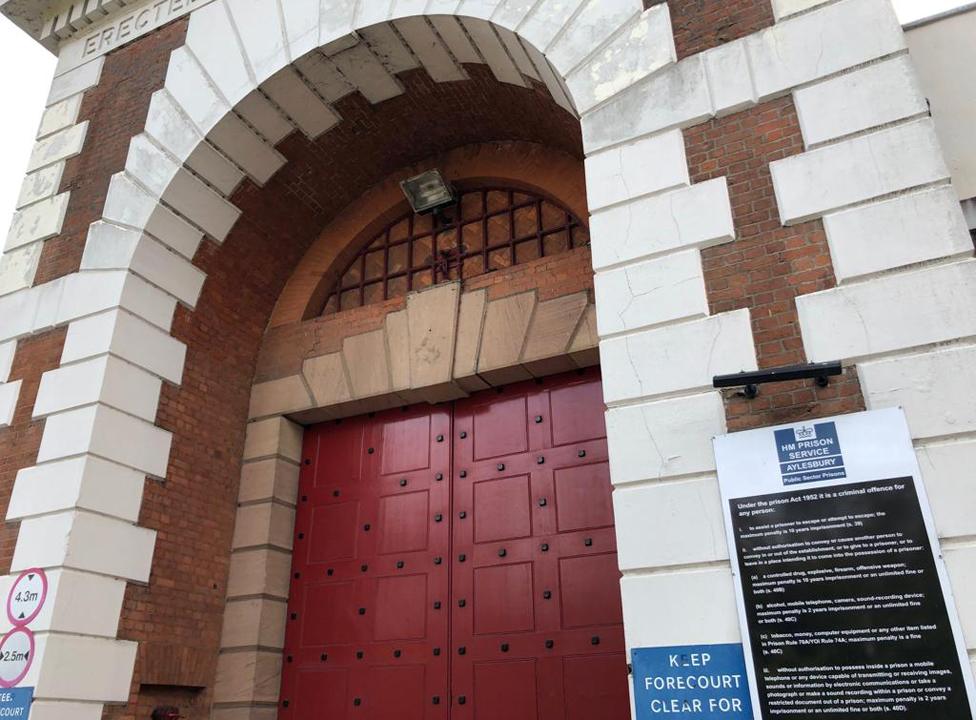
When I arrive in November, the graduates are into their seventh week. I watch as, armed with latex gloves and metal detectors, they practise a cell search. They scour every corner and lift up the mattress, looking for drugs, mobile phones, home-made weapons and other contraband.
"You always have to check the window sill and need to make sure there are no holes in the mesh, so drones [carrying drugs] can't gain access," says Ms Wilkinson, who studied law and criminology at Sheffield University. "If we find any powder or anything that looks like drugs we can take it to security and get a test done on it."
Mr Rai had to get accustomed to wearing a wristwatch because mobile phones are banned at work. But he doesn't miss his phone, he adds, because the officers always seem to be in a rush to get jobs done, from fetching toilet roll for prisoners to fixing healthcare appointments and finding out about parole board hearings.
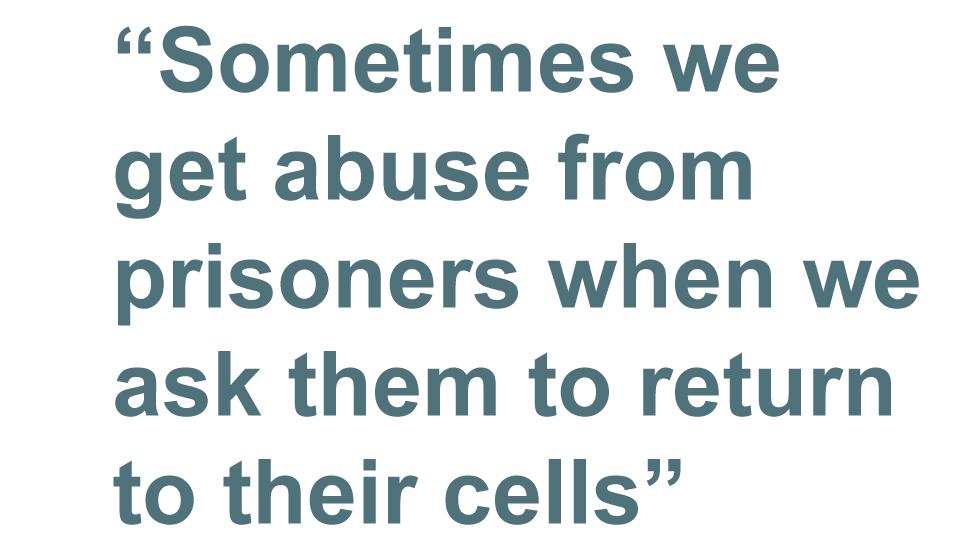
"If dinner's late it can impact on shower time, and if people are missing out on showers that can impact on their mood and lead to violence and aggression the next day," he says. "That's why we have to be really on point with all our timings."
In April last year, prisoners on Aylesbury's E wing threw paint and smashed cameras and fire alarms in protest at being forced to go several days without taking a shower. Four officers suffered minor injuries. It's one of many examples of disorder that official reports link to understaffing.
In the first half of this decade, 7,000 prison officers were cut from the service in England and Wales; there were about 22,000 left in 2018. While there has been some new recruitment since then, the numbers resigning have also risen.
I wondered whether some of the old guard at Aylesbury resented the graduates coming in with suggestions of how to run things better.
"Some of them were a bit suspicious at first," says Andy Bainbridge, the graduates' mentor and a veteran prison officer. "They might have thought, 'What is this new scheme? Why are they better than we are?' But an awful lot of that mentality left with the cuts.
"Now an experienced member of staff has shifted from being somebody with 15-plus years in to being somebody that's got more than 12 months in, and most are happy to see very capable and incredibly willing people coming in to help the service."
Just before Christmas, I meet some of the graduate officers again in a cafe near the prison. Ms Russell, a criminology graduate from Lancaster University, explains how the squeeze on time affects her.
"Sometimes we get abuse from prisoners when we ask them to return to their cells," she says. "But it's usually just because they just want to have two minutes talking to their friends and sometimes we don't have those two minutes to give them. At the beginning it was distressing being shouted at but now I understand it is not because of anything I did wrong but because of the situation."
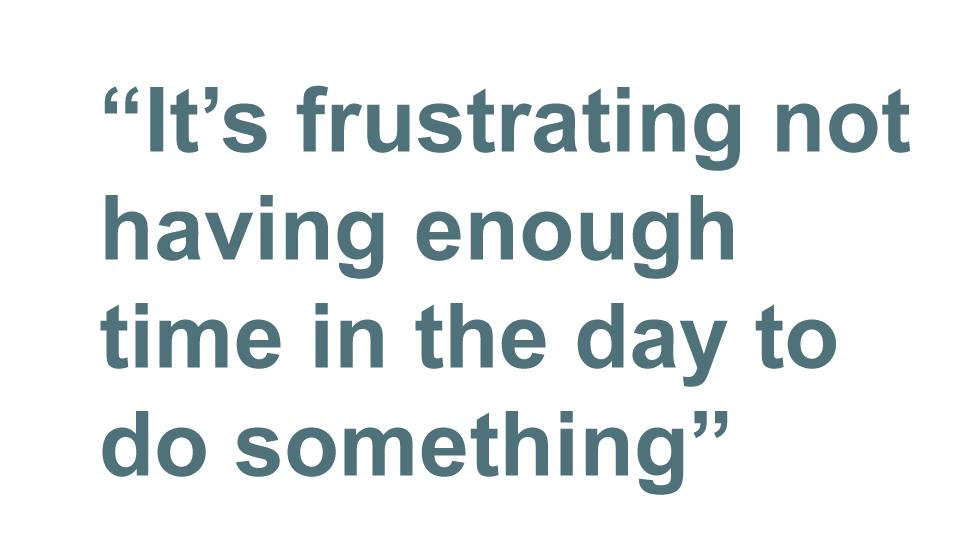
Ms Chowdhury, another recruit, was full of idealism about using her degree in psychology to transform prisoners' lives when I first met her in Ipswich. Now she has more modest goals.
"Everybody would like to come up with a fantastic new idea to change the prison system," she says. "But in reality, it doesn't work like that. It's frustrating not having enough staff and not having enough time in the day to do something. A good day would be fulfilling requests guys need, such as credit on their phones, or getting their clothes from laundry."
I am only allowed into Aylesbury prison for a couple of hours at a time. Occasionally there is a lot of shouting and banging but it often seems eerily quiet because most of the inmates are behind their doors.
Once on the ground floor I meet a prisoner carrying a mop and bucket - he is a wing cleaner - one of the few trusted to do a job outside his cell. The press officers try to move me on, but I grab a few seconds with him. He hasn't heard about the Unlocked scheme and has low expectations about the support he can get from prison staff.
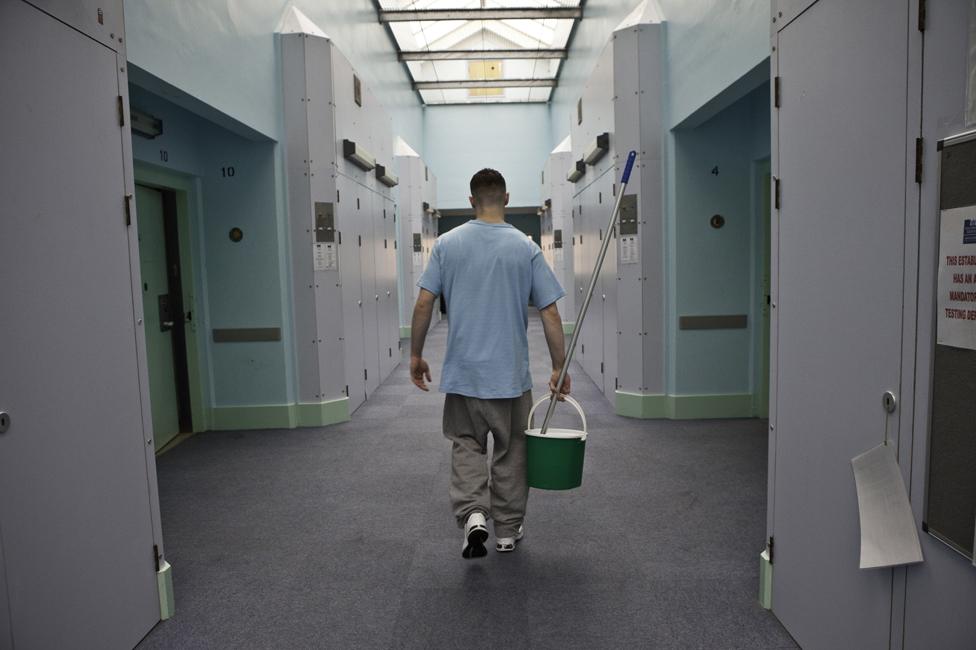
Prisoner on cleaning duty in 2009
"Some of them do talk to us, some of them do try and help but that is only a minority," he tells me. "Most of the guards just want to bang us up and that is it."
The chief inspector of prisons says inmates should be unlocked for a minimum of 10 hours a day. But at Aylesbury, up to 42% of prisoners can be inside their cells all day, external - deprived of external contact.
Not surprisingly, when they are allowed out their frustrations can boil over.
"I'd be lying to say I wasn't scared," says Ms Chowdhury, a petite woman who wears glasses. "But it comes with the job and working in the police or in a hospital you could get the same thing."
She adds: "You can go home in tears one day, but another day I'll be crying tears of laughter, joking with my colleagues or with the prisoners. You can have a really bad day at work, but you learn to bounce back from it."
She says all the graduates have at times found the going tough. "You can be thinking, 'Oh My God! I'm not good at this, what am I doing?'"
It wouldn't be surprising if she and the other grads sometimes felt overwhelmed. By April several complaints have been upheld by the Prison and Probation Ombudsman about some inmates being held in the Aylesbury segregation unit for months on end.
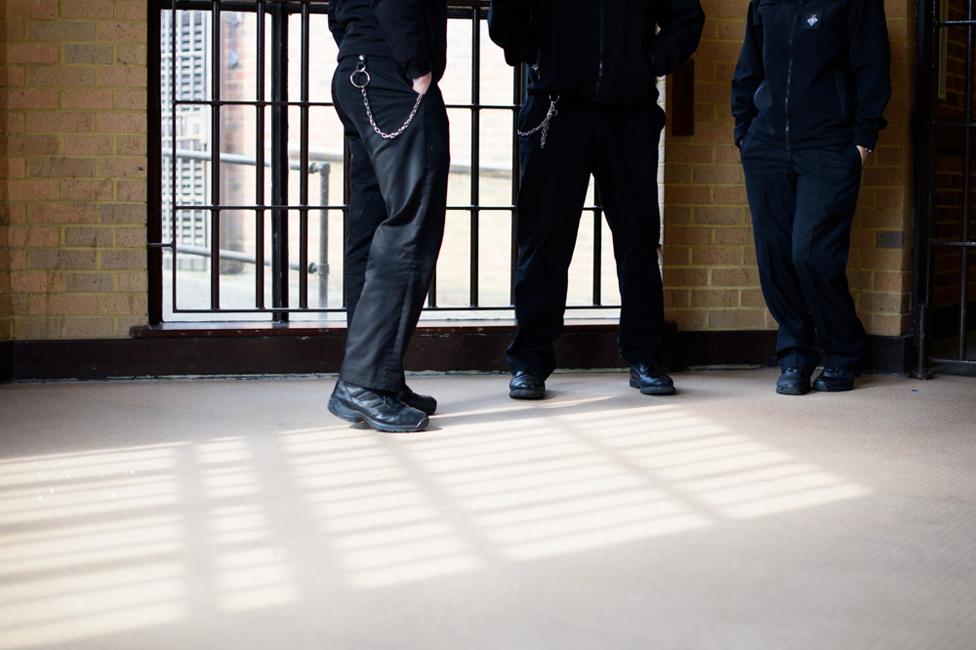
Laura Janes, the legal director of the Howard League for Penal Reform, says that in the past 12 months the charity has received 60 calls from young people complaining about being isolated in their cells at Aylesbury. One client, whom she calls Mr X, was moved to the segregation unit in July 2018 and he remained there until at least September.
She says, "we are not talking about little angels" and sometimes prisoners have to be put in the unit for safety reasons. But from the evidence provided by staff at Aylesbury it appears that prisoner X had at most a daily half an hour out of his cell for association, and 20 minutes of shower time.
"What the Ombudsman found was that staff only became more pro-active about this young person's care and location after he had resorted to self-harming by overdosing," she adds.
As a result of this and other cases, Aylesbury has now been put into special measures.
That means that half of the population will be shipped out to other prisons in the coming weeks. Laura Sapwell, the governor, tells me that she welcomes that.
"We've had a challenging time here," she says. "We have not been fully staffed for a long time and we've been on a restricted regime but now there will be more opportunity to do some of those innovative things that I know the grads want to do."
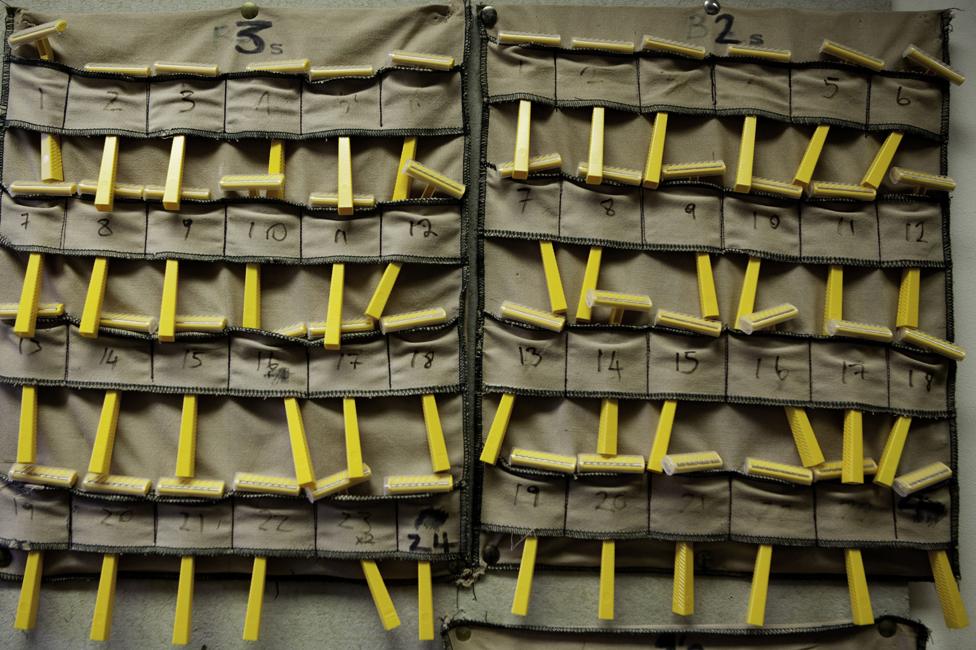
Prisoners at Aylesbury are not allowed razors in their cells
As I am leaving her office, the governor lets slip that one of the graduates was badly injured trying to restrain a prisoner and had to be taken off front-line duties. I have been asked not to specify which one.
Prisons are designed to punish as well as rehabilitate but Aylesbury hands out more additional days behind bars for breaking the rules than any other prison in England and Wales. Yet even in this difficult environment, the grads have made some headway - especially, says Ms Russell, with the shyer prisoners.
"One of them used a rap and a poem to articulate what he was going through and to explain the way he was managing his feelings," she says. "That was a really nice moment for me."
One of the prisoners, called John, who welcomes me into his immaculately tidy cell, is full of praise for Ms Chowdhury.
"When I came to this jail I was messing about a lot," he admits. "She advised me to try and keep my head down, try and get a prison job. When you get along easier with the governor you make it easier for yourself."
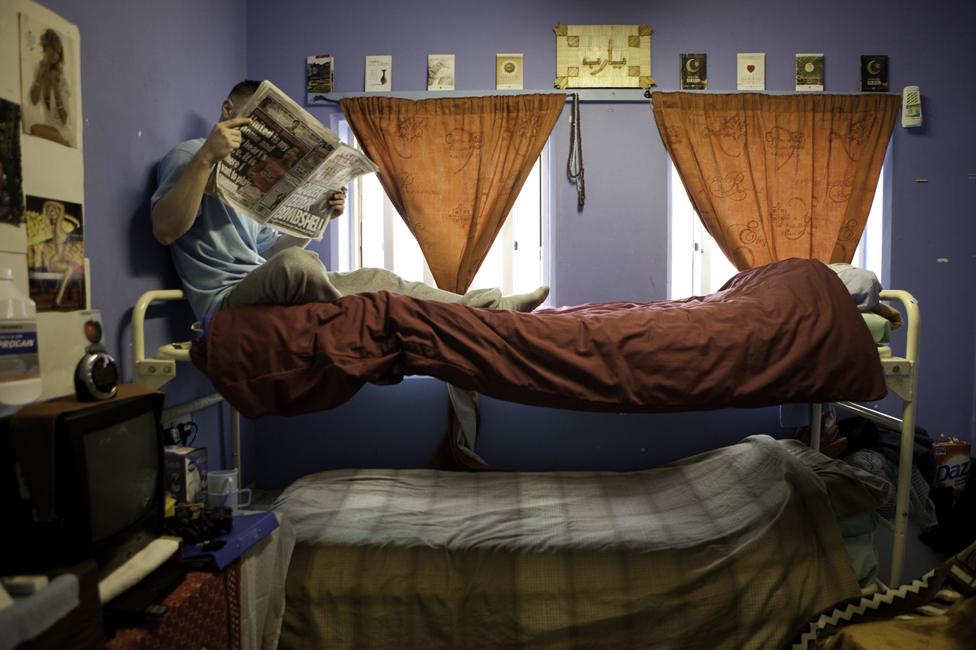
An Aylesbury prisoner reads in bed (2009)
Ms Cathcart, who studied criminology at Liverpool University and is "passionate about rehabilitation", reveals she has had some awkward moments.
"I had one lad who liked to call me 'princess', and I didn't really feel comfortable with it," she says. "So, it was just a question of nipping that sort of talk in the bud before it snowballed into worse."
Both she and the other graduates are aware that some officers have got too close to their young charges. A female officer at Aylesbury was jailed in 2017 for having a relationship with an inmate. Last November another female officer was sentenced to six-and-a-half years, after smuggling £10,000 worth of drugs into the prison.
Ms Wilkinson and Ms Russell have found inmates respect them more when they make it clear that they are on top of everything going on - good and bad. So they invented a new spreadsheet tracking each prisoner's tally of what they call IAPs, incentives and punishments.
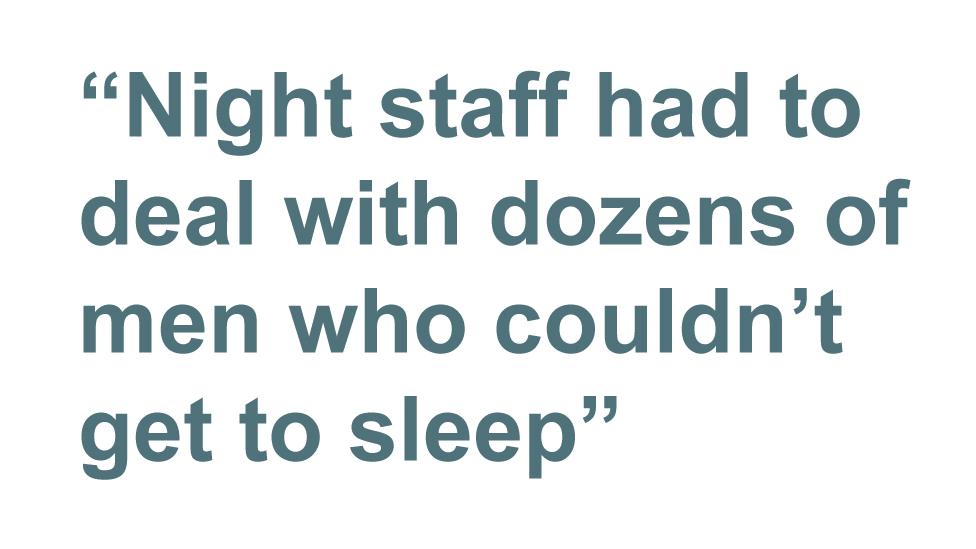
Prisoners forfeit privileges, like family visits, if they get three black marks. "But they know that when they do something good it will actually be worthy of a positive, and that really motivates them," says Ms Russell.
Unlocked Graduates in other prisons have also introduced some innovations. Ms Adio Pereira, who studied social policy at Birmingham University, noticed that the system for distributing medicines at Wandsworth Prison, was inefficient and involved queues.
"You often found people were having to go back behind their doors without getting their prescribed antipsychotics or their sleeping tablets," she says. "So then the night staff had to deal with dozens of men who couldn't get to sleep, banging on their doors for hours."
She found a simple solution - opening up more hatches on the wing to dole out medicines and creating a new rota.

Ms Pereira at a Downing Street reception for the first graduating cohort of Unlocked Graduates
"It reduced the frustration," she says with a smile. "We often have men telling us, 'This is really great, we now receive our medication on time, that was really helpful.'"
Ms Adio Pereira is in her second year of the scheme and has already been promoted - she's now a senior officer, in charge of a wing. She says she wanted to join the Unlocked scheme because many of the people she grew up with in south-east London got sucked into the criminal justice system. "Some of them just took the wrong turn in life," she says.
She is planning to stay on at Wandsworth once her two years are over, but the graduates at Aylesbury have not yet made up their minds. For the moment they are thinking about their dissertations: Ms Wilkinson wants to focus on prison gangs, while Ms Chowdhury is interested in exploring mental health in the segregation unit.
In the first year of the scheme, one in five graduates left. Perhaps the majority will leave the Prison Service when their two years are up - after all, the scheme is sold to graduates as a leadership development programme first and foremost.
Natasha Porter, the founder of Unlocked Graduates, insists she wants some of her rookie officers to move into other careers - such as politics, business and journalism. The idea is to make society as a whole care more about what goes on inside prisons.
"It's the service that's been most cut in this government and I think that's partly because it's invisible - people don't see it happening," she says. "The Prison Service is in desperate need of some political leverage and that's what we hope to provide with our participants in the future."
Former drug addict Peter Yarwood spoke eloquently about the difference an individual officer can make. The Unlocked graduates may also make that difference, though whenever I visited Aylesbury they were looking at their watches, wondering if they could get the most basic jobs done before the end of their shift.
Pictures courtesy of Unlocked Graduates, unless otherwise indicated.
You may also be interested in:
What is the point of sending someone to prison - retribution or rehabilitation? Twenty years ago, Norway moved away from a punitive "lock-up" approach and sharply cut reoffending rates. The BBC's Emma Jane Kirby went to see the system in action, and to meet prison officers trained to serve as mentors and role models for prisoners.
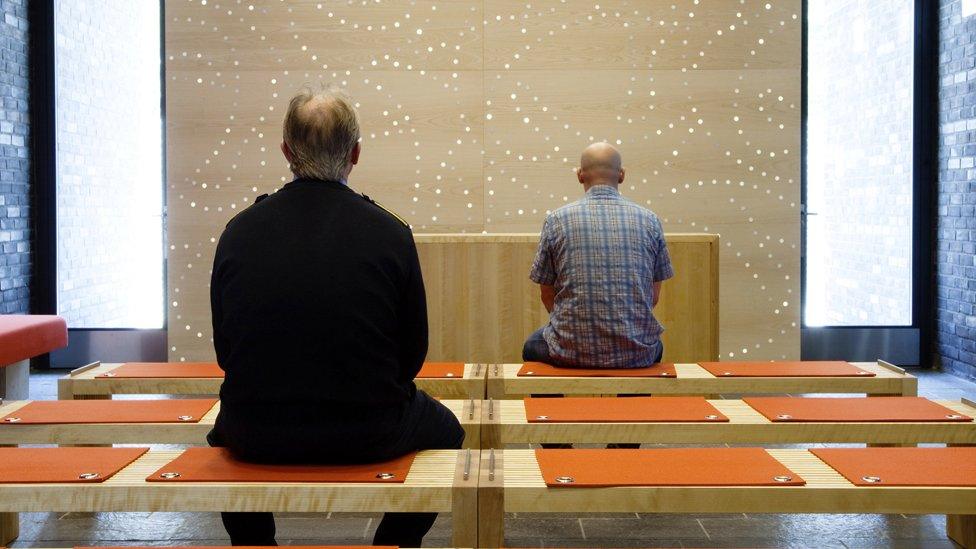
The prayer room in Halden prison
- Published3 April 2018
